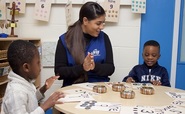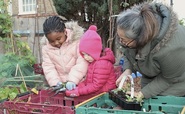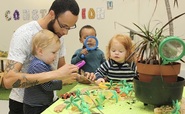
In August 2017, 300 childcare practitioners from the London Early Years Foundation (LEYF) filed into London Hilton Metropole. They were there for the nursery provider’s annual conference, a gathering that offers LEYF staff the opportunity to learn and develop their practice – to be the best they can be for our children. But when they left they were no longer practitioners. Instead, they were now nursery teachers.
It was a long-overdue transformation, says June O’Sullivan, chief executive of the London Early Years Foundation (LEYF). For too long childcare professionals have been divided rather than united by their qualifications.
“I hate all this game playing that goes on in the nursery sector,” says June. “This attitude of I’m more than you because I’m level 3 and you’re level 2. It’s really unhelpful. It creates divisions between us that shouldn’t be there.”
June compares the attitude to that in meetings she attends with chief executives from other organisations. “In those meetings no-one asks me how many degrees I’ve got,” she says. “They just see me as a chief executive. Yet when you go into a room in an early years setting, people ask if you’re level 2, level 3, degree-holder or early years professional. How does that help anyone’s confidence and ability to collaborate?”
Time for change
So in summer 2017, June decided it was time for change. Time to end the divisions and recognise the shared expertise of the staff who work in LEYF’s 38 nurseries.
And there was really only one word that captured the true essence of what childcare practitioners do: teacher.
Science tells us that children’s brains are literally built by their experiences and interactions. This means Early Years practitioners have a huge responsibility to provide strong foundations for children’s development “Teacher describes what we do. At LEYF we really believe this is an important job and so it should be named for what it is,” she says.
Parents and children also agreed. Ahead of the renaming, LEYF consulted with the families that rely on its nurseries and asked them what they would call their practitioners. The same answer came back time and time again: teacher.
‘Our work is valued’
For the LEYF nursery teachers the new title makes a big difference. “I feel that it shows that the company recognises us for what we are – teachers in every sense of the word,” says Liz, a room leader at LEYF’s Holcroft nursery near Regent’s Park.
Kanella, a nursery teacher at the social enterprise’s Fitzrovia nursery agrees. “I like LEYF’s idea of us being called teachers not practitioners because our work is valued and we are role models who teach the children through play,” she says.
The introduction of the nursery teacher title also connects well with LEYF’s distinctive pedagogical approach to childcare.



Strong pedagogy
“Calling our staff teachers has changed the narrative within our nurseries,” says June. “It’s made us much more focused on teaching. We have a strong pedagogy and the combination of that and calling our staff teachers has improved our teaching. It’s given people confidence and frames our conversations in a context of teaching children.”
David Stevens, a pre-school room leader at LEYF’s Weir Link nursery in Clapham, agrees: “During my 23 years with LEYF I have had the titles nursery nurse, nursery practitioner, early years practitioner and nursery teacher. I feel that nursery teacher explains exactly what our role is with the children. It encapsulates the learning provocation, excitement, awe, play, fun, educating and experience of being a child at a LEYF nursery.”
University partnership
The introduction of the LEYF nursery teacher title also chimes well with its training offer, which seeks to ensure its staff can keep developing in their career without ever having to leave the organisation.
“People here can even do their degree without leaving because of the partnership we have with the University of Wolverhampton,” says June. “Our development offer allows people to progress without having to leave. Early Years is often seen as a stepping stone to becoming a school teacher but I want our staff to feel like, ‘why would I do that?’ We give people the space to grow here. It’s easy to talk the talk on training but we’re a provider that actually delivers. And making all our staff teachers is very much part of that.”
Be more than a practitioner. Be a LEYF nursery teacher. Click here to see the latest opportunities to join LEYF.
